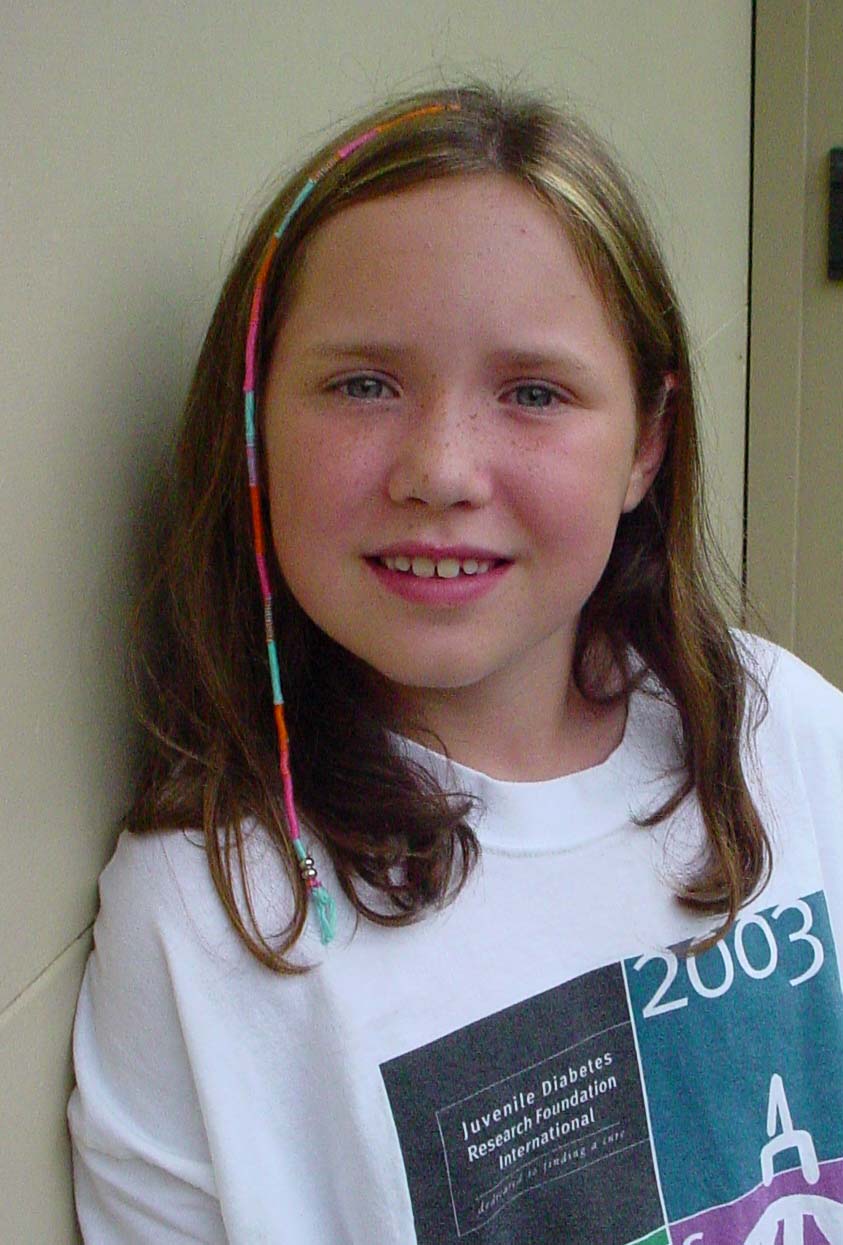
Press
Release (July 7, 2003)
Juvenile
Diabetes Research Foundation
Unite To Cure Diabetes, Washington DC
June 21-24, 2003
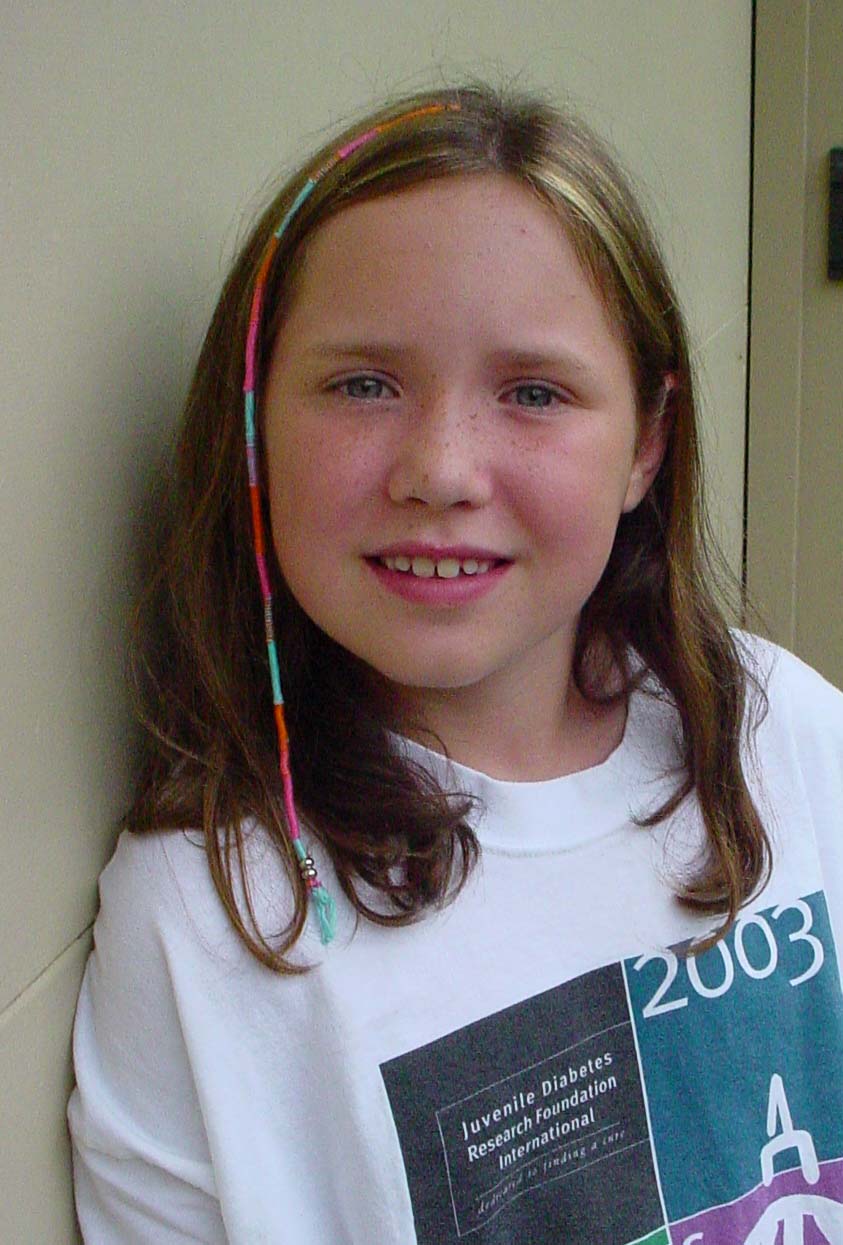

Introduction of Chair Family, Rik Bonness (a former NFL player), wife Shannon, sons Eric (18) diagnosed at age 7 and Alex (15) diagnosed at age 4. Rik opened by talking about the two year JDRF international public awareness and fundraising initiative, Unite To Cure Diabetes. The Unite kickoff includes the 2003 Children’s Congress, the Washington Chapter’s Launch Walk to Cure Diabetes and special dinners at embassies of countries where JDRF funds research. JDRF created this two-year program to support their mission and underscore their position as a global leader and catalyst in fundraising for juvenile diabetes research.
Children’s
Congress-Children with juvenile (type 1) diabetes—ages 2 to 17, representing
all 50 states and the District of Columbia—went to Washington to tell their
personal stories and urge lawmakers to help find a cure for juvenile diabetes.
Children’s Congress has been held every other year since 1999, and it has
become the largest media and grassroots event held in support of finding a cure
for juvenile diabetes, raising national awareness about juvenile diabetes, and
its delegates participating in personal advocacy at the highest level of United
States government. The President and Laura W. Bush are Honorary Co-Chairs of
Children’s Congress 2003; Congressional Co-Chairs are Senator Susan Collins
(R-ME), Senator John Breaux (D-LA), Representative George Nethercutt (R-WA), and
Representative Diana DeGette (D-CO).
After dinner each of the 200 children went up to the microphone and introduced themselves giving their name, age, home city and state and when they were diagnosed.
Sunday 6/22: Walk to Cure Diabetes at Freedom Plaza-

All 200 Children’s Congress Delegates along with their families joined Washington DC residents in the DC Chapter’s Launch Walk to Cure Diabetes. Stephanie Treubig and Annie Mizner carried an Ohio State flag the entire Walk along with the other Delegate and most family members who had flags representative of the state where they were from. The four-mile walk looped around Washington’s famous Mall from the Lincoln Memorial to the Smithsonian Building and ended with a lunch and concert back at Freedom Plaza. This Walk is the kick-off for the national Walk season. Over 250 cities around the country have organized Walk’s this year that are expected to take us almost $71 million closer to a cure.

Locally Akron/Canton will have the Walk to Cure Diabetes on September 13, 2003 at the Canton Pro Football hall of Fame where Stephanie will lead “Team Stephanie” and Annie will be a member of a team as well. The Cleveland area Walk will be held on September 20, 2003 at the Cleveland Metropark Zoo.
After lunch each state delegation posed for a group photo with Sugar Ray Leonard, who himself has had several family members suffer with juvenile diabetes.

Sugar Ray Leonard, Juvenile Diabetes Research Foundation celebrity advocate and boxing legend, pictured with young Children's Congress 2003 delegates representing Ohio. The delegates are ( L – R): Kelley Raines, Connor Stephens, Elizabeth Gildea, Annalise Mizner Stephanie Treubig, Christopher Gindele, LaNiece Evans-Scott and Brittany Garza.
Monday 6/23: “Promise to Remember Me” Song Performance and Program-
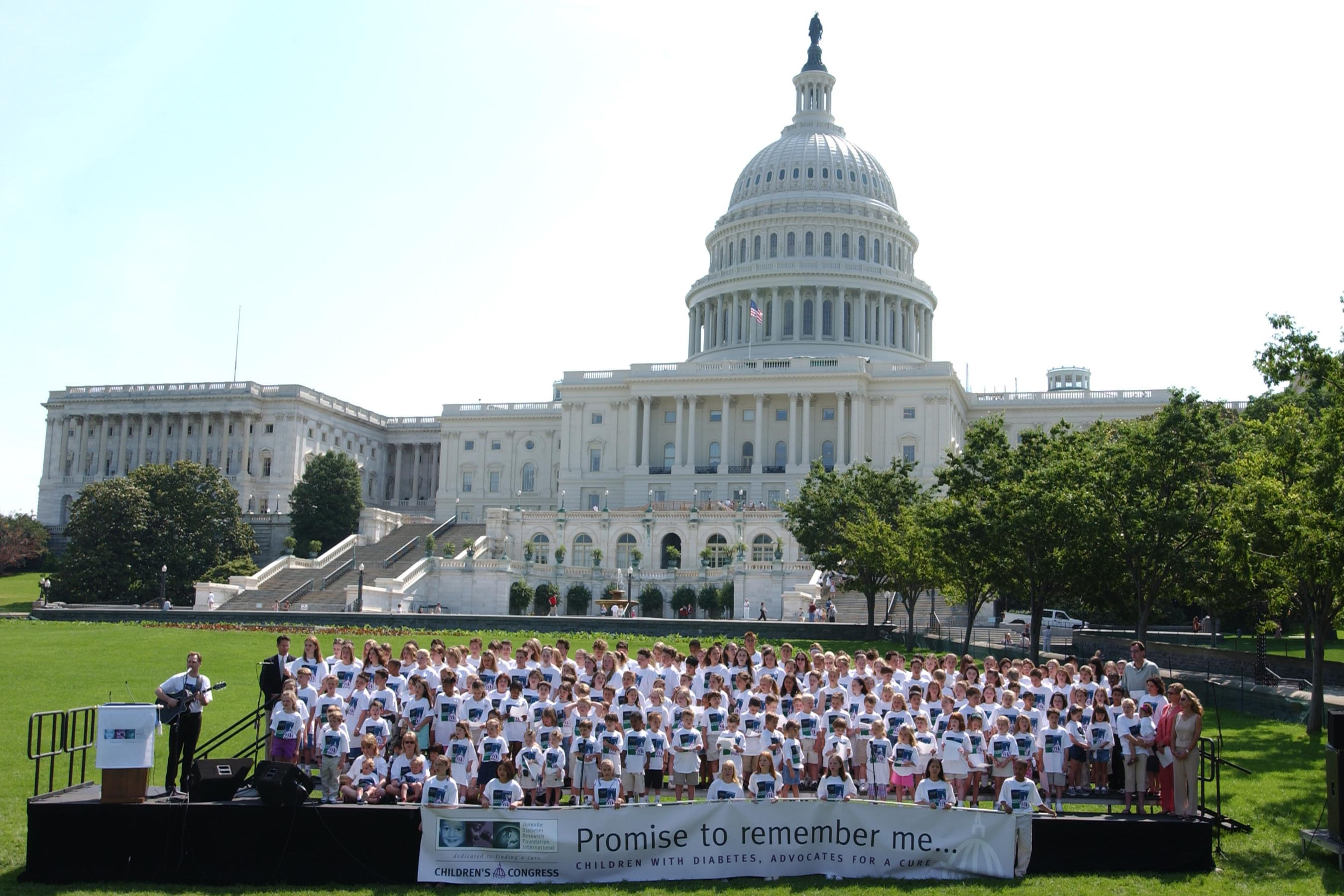
Led by Grammy-winning country music star Steve Wariner, 200 children with juvenile diabetes sung, “Promise to Remember Me” on the Capitol Lawn.
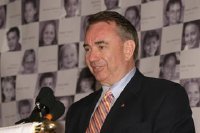
Town Hall Meeting led by Tommy G. Thompson, Secretary of the U.S. Department of Health and Human Services and Dr. Allen Spiegel, Director of the National Institute of Diabetes and Digestive and Kidney Diseases (NIDDK) of the National Institutes of Health (NIH). The children asked questions about the state of juvenile diabetes research and Government policy related to finding a cure for diabetes.

Stephanie Treubig was selected to ask a question. She asked Dr. Spiegel, if he felt there was enough money going to the NIH to find a cure for juvenile diabetes. He said there was always a need for more but that there has been an increase in support thanks to the efforts of JDRF. Dr. Spiegel said that he is convinced that we are close to a cure for diabetes.


Tuesday 6/24: Senate Hearing on Juvenile Diabetes before the Senate Committee on Government Affairs chaired by Senator Susan M. Collins (R-ME)-
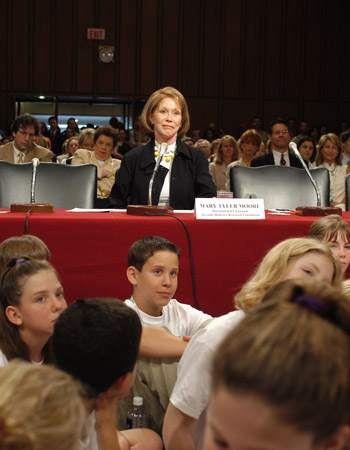
The 200 children with juvenile diabetes from across the country packed a special Senate hearing on Capitol Hill to hear Mary Tyler Moore, International Chairman for JDRF, testify on the urgent need for continued funding to find a cure for diabetes. Others testifying were several children with juvenile diabetes, Allen Spiegel, M.D, Director of the NIDDK, Bernhard J. Hering, M.D., Associate Director of the Diabetes Institute for Immunology and Transplantation and the head of the Islet Research and Transplantation Program, and Anne Seidel, juvenile diabetes sufferer for more than 35 years. Ms. Seidel recently received islet cell transplants, and is now free from insulin injections.
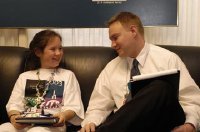
Individual
Capitol Hill Visits-
Ten-year-old
Stephanie Treubig of Hudson who was diagnosed at age 7 met with Congressman
Steven LaTourette’s (OH-14) Legislative Assistant, Ryan S. Berger in
Congressman LaTourette’s office on Capitol Hill. Stephanie’s message to the
Congressman was first to thank him for his support for the Special Diabetes
Program, a bill passed last year doubling the budget of the NIH. She also
thanked him for being a member of the Diabetes Caucus,
the Diabetes Caucus was formed in 1996 and has grown to be the
largest caucus in Congress with 289 members in the 107th Congress. The mission
of the Caucus is to improve the lives of people with diabetes and support
research to find a cure. and
for being a co-sponsor of the Pancreatic Islet Cell Transplantation Act of 2003
(S.518/H.R.1068). This legislation will remove some barriers to expanding islet
transplantation. Nearly 80% of the over 250 islet transplant recipients no
longer need to take insulin to live. Stephanie
also asked the Congressman to support a 10% increase in funding to the NIH this
year to ensure that there is adequate funding to maintain existing grants and
support new opportunities. Stephanie asked Congressman LaTourette to support the
Medicare Prescription Drug Bill to create a five-year Medicare demonstration
project to test coverage of pancreatic islet cell transplantation for
individuals with juvenile diabetes and kidney failure. She told the assistant
that she knows that “diabetes never takes a day off” and described how she
has to divide the grams of carbohydrates of everything she eats by 15 then
multiply by 0.7 before making a life and death decision about how much insulin
to take. She told him that every night she asks her mother to wake up and test
her blood sugar level because she is afraid of going into a coma in her sleep.
Stephanie delivered a packet to the Congressman including a Children’s
Congress tee shirt and year book and a scrapbook that she put together depicting
her struggles living with diabetes as well as her many activities to help fund
research to find a cure and raise awareness about the disease that she lives
with every day. Stephanie asked the assistant to ask Congressman LaTourette to
promise to remember her when he is making future legislative decisions regarding
diabetes and research funding toward finding a cure.

Seven-year-old
Annalise (Annie) Mizner of Wadsworth who was diagnosed at age 5 along with
Stephanie met in Congressman Ralph Regula’s (OH-16) Capitol Hill office. Annie
thanked Congressman Regula for his past support of diabetes research and the NIH.
Annie asked him to continue to support increase funding so she can stop taking
shots and getting “pokes”. Annie delivered a scrapbook that she put together
showing her struggles with diabetes and some of the other activities that she
likes to do. Congressman Regula told the girls that he is very encouraged with
the progress of diabetes research and feels that life for diabetic will continue
to improve.
Ohio Senate Visits-
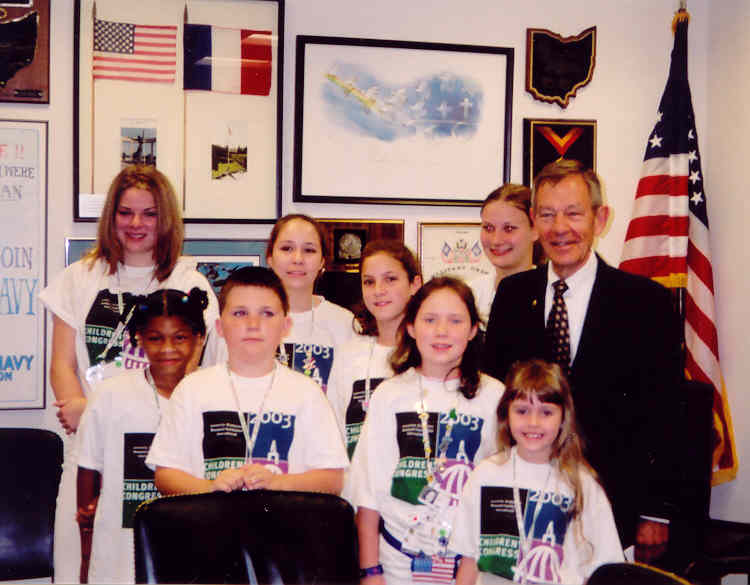
The entire 8 member
Ohio Children’s Congress Delegation met at Senator DeWine’s office with
his Legislative Correspondent, Jennifer Sharp and then with Senator Voinovich in
his office. The children sat around a large conference table and each
delegate described how diabetes affects their life to each Senator. Here is what
each Delegate shared with each Senator:
Kelly said
that the hardest thing for her was a lack of awareness about diabetes in the
people who are around her. She feels that the American public needs to be
educated about juvenile diabetes.
Chris said he
doesn’t remember his life without diabetes since he was diagnosed at age 5 and
he is now 13.
Stephanie said that she doesn’t like getting shots and pricking her fingers and showed how her pump is always attached to her with the tube.
Connor said that
every time he goes horseback ridding he has to make sure his blood glucose level
is above 200 or else he will be low.
Elizabeth said that
she doesn’t get invited over for sleepovers with her friends because the
parents are afraid to take responsibility.
LaNiece said that
she too doesn’t get invited over to friends because they are afraid of the
shots.
Annie said that she hates the shots and the “pokes” and said that it hurts when she doesn’t get enough blood out and has to repoke her fingertips to get some more blood for the meter.
In the two separate meetings the Ohio delegates also thanked Senator DeWine and Senator Voinovich each for their support of the Special Diabetes Program and asked them to support the Pancreatic Islet Cell Transplantation Act of 2003 and a 10% increase in NIH funding. At the end the children delivered a scrapbook to each Senator with a page or two from each delegate that showed how diabetes affects their life for the Senators to keep. Then all the children said in unison, “Please Promise to Remember Me”. Senator DeWine’s Health Aid said she would defiantly pass that message along to the Senator.
Senator
Voinovich said that he now has a better understanding that it isn’t easy to
balance everything when you have juvenile diabetes and that he would defiantly
remember all the children who came to talk to him about life with juvenile
diabetes. He also said that he would consider supporting significant increases
in the NIH budget.
Closing
Dinner-
Mary Tyler Moore
spoke to the children about what a great and powerful message they delivered to
Capitol Hill earlier in the day. She encouraged them to keep up the fight and to
never give up. She presented JDRF’s Hero’s Award to U.S. Speaker of the
House Dennis Hastert (R-IL) for his pivotal role in securing federal funding for
type 1 diabetes research and his support for JDRF.
Family Dance-


The conclusion to
the 2003 Children’s Congress was a family dance. The children and their
families danced to a live band who played all the favorites as the children
danced on and off the stage.
Stephanie said the dance was her favorite part of the trip along with meeting so many other diabetic children from all over the country and knowing that they had something in common, they all need a cure. She brought home a lanyard full of state pins from the states of all the other delegates. She said that the most important and most impressive part of the event was meeting with Senator Voinovich in his office and sitting around the big conference table talking to him. Senator Voinovich had already heard about Stephanie’s advocacy efforts and mentioned that during the meeting.
JDRF,
the leading charitable funder and advocate of juvenile (type 1) diabetes
research worldwide, was founded in 1970 by the parents of children with juvenile
diabetes – a disease which strikes children suddenly, makes them
insulin-dependent for life, and carries the constant threat of devastating
complications. Since inception,
JDRF has provided more than $600 million in direct funding to diabetes research.
In a typical year, 85 percent of JDRF’s expenditures directly support
research and research-related education. JDRF’s
mission is constant: to find a cure
for diabetes and its complications through the support of research.
For more information, visit the JDRF web site at www.jdrf.org
or call 800-533-CURE.
